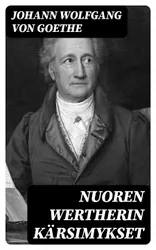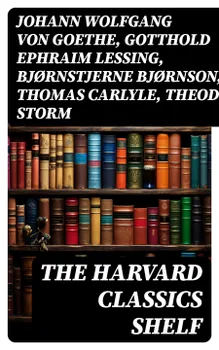The Harvard Classics Shelf of Books stands as a monument of the greatest achievements in literature, science, and philosophy. Curated to impart a comprehensive liberal education, the collection spans from the writings of ancient tragedians like Euripides to the critical essays of Emerson and the novels of Jane Austen. There's a remarkable diversity in form and content, encompassing poetry, philosophy, plays, scientific papers, and foundational texts in political theory and ethics. Through this extensive range, the anthology demonstrates the evolution of human thought and the variety of ways it can be expressed, providing a unique insight into the collective intellectual heritage of humanity. The contributors to this monumental collection were not only pivotal figures in their respective fields but also architects of modern thinking across various disciplines. From the depth of Plato's philosophy to Darwin's groundbreaking work on natural selection, and Goethe's masterful storytelling, each author represented in this compendium brings their unique perspective to the anthology. These works, many of which spearheaded significant movements in their time, from the Enlightenment to Romanticism, and Naturalism, offer a panoramic view of human culture and its development. The diversity of the contributors, spanning different centuries, continents, and fields of study, allows for a rich dialogue between the texts, presenting a multifaceted understanding of the themes explored. The Harvard Classics Shelf invites readers on an unparalleled journey through the pinnacle of human intellectual achievement. This collection is indispensible not only for students and scholars but for anyone eager to engage with the seminal works that have shaped our world. For those seeking to broaden their horizons and deepen their understanding of myriad subjects through the lenses of the greatest minds, this anthology is a treasure trove. It illuminates the interconnectedness of human thought across time and disciplines, providing a rare opportunity to witness the conversation of ideas that has driven the advancement of civilization.

Harvard Classics (All 51 Volumes)
Johann Wolfgang von Goethe, Gotthold Ephraim Lessing, Thomas Carlyle, Plato, René Descartes, Immanuel Kant, Charles Darwin, Martin Luther, Robert Louis Stevenson, William Shakespeare, Dante Alighieri, Euripides, Percy Bysshe Shelley, Charles Lamb, Henry David Thoreau, Samuel Johnson, John Stuart Mill, David Hume, Joseph Addison, John Locke, John Fletcher, Francis Beaumont, Leigh Hunt, Epictetus, Thomas De Quincey, Samuel Taylor Coleridge, Jonathan Swift, Christopher Marlowe, Jacob Grimm, Wilhelm Grimm, William Hazlitt, Marcus Tullius Cicero, Daniel Defoe, Aesop, Richard Henry Dana, John Dryden, Philip Massinger, Pedro Calderón de la Barca, John Ruskin, Oliver Wendell Holmes, Ernest Renan, Robert Burns, David Garrick, Ralph Waldo Emerson, John Webster, Izaak Walton, John Bunyan, James Russell Lowell, Charles Augustin Sainte-Beuve, Homer, Edmund Burke, Plutarch, Molière, Aeschylus, Michael Faraday, Sophocles, William Makepeace Thackeray, Benjamin Franklin, Pierre Corneille, Jean Racine, Voltaire, Robert Browning, Oliver Goldsmith, Thomas Dekker, John Milton, Aristophanes, Blaise Pascal, Virgil, Simon Newcomb, William Penn, Walter Bigges, Philip Sidney, Herodotus, Walter Raleigh, Francis Bacon, Giuseppe Mazzini, Francis Pretty, George Berkeley, Thomas Hobbes, Adam Smith, Alessandro Manzoni, Abraham Cowley, Michel de Montaigne, Ben Jonson, John Woolman, Benvenuto Cellini, Sydney Smith, Jean Froissart, William Henry Harrison, William Harvey, Marcus Aurelius, Hans Christian Andersen, Thomas Malory, George Gordon Byron, Thomas à Kempis, Richard Steele, Thomas Browne, Archibald Geikie, Thomas Babington Macaulay, Tacitus, William Roper, Hippocrates, Miguel de Cervantes, Thomas More, Friedrich von Schiller, Philip Nichols, Louis Pasteur, Joseph Lister, Jean Jacques Rousseau, Pliny the Younger, Edgar Alan Poe, Saint Augustine, Brinsley Sheridan, Hermann Ludwig Ferdinand von Helmholtz, Francis Drake, Edward Haies, Niccolo Machiavelli, Ambroise Paré, William A. Neilson
book
Faust
Johann Wolfgang von Goethe
audiobookbook
Nuoren Wertherin kärsimykset
Johann Wolfgang von Goethe
audiobookbook
World's Greatest Classics in One Volume : Les Misérables, Hamlet, Jane Eyre, Ulysses, War and Peace, Art of War, Faust, Don Quixote, Bushido…
Johann Wolfgang von Goethe, Stendhal, Jules Verne, Gustave Flaubert, Lewis Carroll, Henrik Ibsen, Charles Dickens, Plato, Honoré de Balzac, Mark Twain, Harriet Beecher Stowe, Rabindranath Tagore, Fyodor Dostoyevsky, Walt Whitman, Niccolò Machiavelli, Oscar Wilde, Robert Louis Stevenson, James Fenimore Cooper, Edgar Allan Poe, William Shakespeare, Giovanni Boccaccio, Confucius, George MacDonald, Bram Stoker, Charlotte Brontë, Emily Brontë, Henry David Thoreau, Weedon Grossmith, Jack London, Henry James, Louisa May Alcott, Victor Hugo, Arthur Conan Doyle, Frances Hodgson Burnett, Joseph Conrad, Jane Austen, Herman Melville, George Eliot, Laurence Sterne, Thomas Hardy, Jonathan Swift, Edith Wharton, Benito Pérez Galdós, Daniel Defoe, Henry Fielding, Alexandre Dumas, Kalidasa, Kenneth Grahame, Marcel Proust, Willa Cather, Nathaniel Hawthorne, Homer, Gaston Leroux, Charles Baudelaire, Wilkie Collins, William Makepeace Thackeray, Voltaire, Kate Chopin, Apuleius, John Milton, Frederick Douglass, Laozi, John Keats, James Joyce, Ann Ward Radcliffe, Kahlil Gibran, Kakuzo Okakura, Soseki Natsume, Princess Der Ling, H. G. Wells, W. B. Yeats, J. M. Barrie, G. K. Chesterton, T. S. Eliot, L. M. Montgomery, C. S. Lewis, D. H. Lawrence, E. M. Forster, H. P. Lovecraft, Marcus Aurelius, Friedrich Nietzsche, Lewis Wallace, Ivan Turgenev, Anton Chekhov, Leo Tolstoy, Nikolai Gogol, Sir, George Bernard Shaw, Miguel de Cervantes, Mary Shelley, Cao Xueqin, Emile Zola, Válmíki, Bankim Chandra Chatterjee, P. B. Shelley, Elizabeth von Arnim, Herman Hesse, Dante, Pedro Calderon de la Barca, Sun Tzu, Inazo Nitobé
book
180 Masterpieces of World Literature (Vol.2) : Life is a Dream, The Awakening, Babbitt, Sense and Sensibility, Dubliners, Notre Dame, Odyssey…
Johann Wolfgang von Goethe, Stendhal, Jules Verne, Gustave Flaubert, Theodor Storm, Henrik Ibsen, Charles Dickens, Honoré de Balzac, Harriet Beecher Stowe, Rabindranath Tagore, Fyodor Dostoyevsky, James Fenimore Cooper, Edgar Allan Poe, John Buchan, Confucius, George MacDonald, Bram Stoker, Henry James, Victor Hugo, Joseph Conrad, Jane Austen, Walter Scott, Laurence Sterne, Thomas Hardy, Jonathan Swift, Edith Wharton, Benito Pérez Galdós, Daniel Defoe, Henry Fielding, Sinclair Lewis, Anthony Trollope, Alexandre Dumas, William Dean Howells, Virginia Woolf, William Walker Atkinson, Kenneth Grahame, Washington Irving, Willa Cather, Nathaniel Hawthorne, Homer, Gaston Leroux, Ford Madox Ford, Benjamin Franklin, Kate Chopin, John Milton, Edgar Wallace, Laozi, James Joyce, Ann Ward Radcliffe, Kakuzo Okakura, H. G. Wells, W. B. Yeats, J. M. Barrie, G. K. Chesterton, Jerome K. Jerome, L. M. Montgomery, W. Somerset Maugham, E. M. Forster, F. Scott Fitzgerald, Lewis Wallace, Ivan Turgenev, Leo Tolstoy, Nikolai Gogol, George Bernard Shaw, Cao Xueqin, Emile Zola, Bankim Chandra Chatterjee, P. B. Shelley, Elizabeth von Arnim, Dante, Pedro Calderon de la Barca, Émile Coué, George Weedon Grossmith, Willkie Collins, D.H. Lawrence, Machiavelli
book
Harvard Classics Anthology - Complete 51 Volumes : The Greatest Works of World Literature - Dr. Eliot's Five Foot Shelf
Johann Wolfgang von Goethe, Gotthold Ephraim Lessing, Thomas Carlyle, Plato, René Descartes, Immanuel Kant, Charles Darwin, Martin Luther, Robert Louis Stevenson, William Shakespeare, Dante Alighieri, Euripides, Percy Bysshe Shelley, Charles Lamb, Henry David Thoreau, Samuel Johnson, John Stuart Mill, David Hume, Joseph Addison, John Locke, John Fletcher, Francis Beaumont, Leigh Hunt, Epictetus, Thomas De Quincey, Samuel Taylor Coleridge, Jonathan Swift, Christopher Marlowe, Jacob Grimm, Wilhelm Grimm, William Hazlitt, Marcus Tullius Cicero, Daniel Defoe, Aesop, Richard Henry Dana, John Dryden, Philip Massinger, Pedro Calderón de la Barca, John Ruskin, Oliver Wendell Holmes, Ernest Renan, Robert Burns, David Garrick, Ralph Waldo Emerson, John Webster, Izaak Walton, John Bunyan, James Russell Lowell, Charles Augustin Sainte-Beuve, Homer, Edmund Burke, Plutarch, Molière, Aeschylus, Michael Faraday, Sophocles, William Makepeace Thackeray, Benjamin Franklin, Pierre Corneille, Jean Racine, Voltaire, Robert Browning, Oliver Goldsmith, Thomas Dekker, John Milton, Aristophanes, Blaise Pascal, Virgil, Richard Brinsley Sheridan, Simon Newcomb, William Penn, Walter Bigges, Philip Sidney, Herodotus, Walter Raleigh, Francis Bacon, Giuseppe Mazzini, Francis Pretty, George Berkeley, Thomas Hobbes, Adam Smith, Alessandro Manzoni, Abraham Cowley, Michel de Montaigne, Ben Jonson, John Woolman, Benvenuto Cellini, Sydney Smith, Jean Froissart, William Henry Harrison, William Harvey, Marcus Aurelius, Hans Christian Andersen, Thomas Malory, George Gordon Byron, Thomas à Kempis, Richard Steele, Thomas Browne, Archibald Geikie, Thomas Babington Macaulay, Tacitus, William Roper, Hippocrates, Miguel de Cervantes, Thomas More, Friedrich von Schiller, Philip Nichols, Louis Pasteur, Joseph Lister, Jean Jacques Rousseau, Pliny the Younger, Edgar Alan Poe, Saint Augustine, Hermann Ludwig Ferdinand von Helmholtz, Francis Drake, Edward Haies, Niccolo Machiavelli, Ambroise Paré, William A. Neilson
book
150 Classics You Should Read Before You Die : Romeo and Juliet, Emma, Vanity Fair, Middlemarch, Tom Sawyer, Faust, Notre Dame de Paris, Dubliners, Odyssey
Johann Wolfgang von Goethe, Stendhal, Jules Verne, Gustave Flaubert, Lewis Carroll, Charles Dickens, Plato, Honoré de Balzac, Mark Twain, Harriet Beecher Stowe, Walt Whitman, Oscar Wilde, Robert Louis Stevenson, James Fenimore Cooper, Edgar Allan Poe, William Shakespeare, George MacDonald, Bram Stoker, Charlotte Brontë, Anne Brontë, Emily Brontë, Henry David Thoreau, Jack London, Henry James, Louisa May Alcott, Victor Hugo, Arthur Conan Doyle, Frances Hodgson Burnett, Joseph Conrad, Jane Austen, Herman Melville, George Eliot, Laurence Sterne, Thomas Hardy, Jonathan Swift, Edith Wharton, Daniel Defoe, Henry Fielding, Kenneth Grahame, Marcel Proust, Willa Cather, Nathaniel Hawthorne, Homer, Gaston Leroux, William Makepeace Thackeray, Kate Chopin, Apuleius, John Milton, Frederick Douglass, John Keats, James Joyce, Ann Ward Radcliffe, Kahlil Gibran, H. G. Wells, W. B. Yeats, J. M. Barrie, G. K. Chesterton, T. S. Eliot, L. M. Montgomery, C. S. Lewis, D. H. Lawrence, E. M. Forster, H. P. Lovecraft, Marcus Aurelius, Friedrich Nietzsche, Lewis Wallace, Sir, George Bernard Shaw, Mary Shelley, P. B. Shelley, Elizabeth von Arnim, Herman Hesse, George Weedon Grossmith, Willkie Collins
book
The Ultimate Book Club: 180 Books You Should Read (Vol.2) : Life is a Dream, The Awakening, Babbitt, Strange Case of Dr Jekyll and Mr Hyde, Sense and Sensibility
Johann Wolfgang von Goethe, Stendhal, Jules Verne, Gustave Flaubert, Theodor Storm, Henrik Ibsen, Charles Dickens, Honoré de Balzac, Harriet Beecher Stowe, Rabindranath Tagore, Fyodor Dostoyevsky, Anonymous, Robert Louis Stevenson, James Fenimore Cooper, Edgar Allan Poe, John Buchan, Confucius, George MacDonald, Bram Stoker, Henry James, Victor Hugo, Joseph Conrad, Jane Austen, Laurence Sterne, Thomas Hardy, Jonathan Swift, Edith Wharton, Daniel Defoe, Henry Fielding, Sinclair Lewis, Anthony Trollope, Alexandre Dumas, William Dean Howells, Kalidasa, Virginia Woolf, William Walker Atkinson, Kenneth Grahame, Washington Irving, Willa Cather, Nathaniel Hawthorne, Homer, Gaston Leroux, Wilkie Collins, Ford Madox Ford, Benjamin Franklin, Kate Chopin, John Milton, Charlotte Perkins Gilman, Edgar Wallace, Kurt Vonnegut, Laozi, Ann Ward Radcliffe, Kakuzo Okakura, H. G. Wells, W. B. Yeats, J. M. Barrie, G. K. Chesterton, Jerome K. Jerome, L. M. Montgomery, W. Somerset Maugham, E. M. Forster, F. Scott Fitzgerald, Friedrich Nietzsche, Lewis Wallace, Nikolai Leskov, Ivan Turgenev, Leo Tolstoy, Nikolai Gogol, Sir, George Bernard Shaw, Cao Xueqin, Emile Zola, Válmíki, Bankim Chandra Chatterjee, P. B. Shelley, Elizabeth von Arnim, Dante, Pedro Calderon de la Barca, Émile Coué, D.H. Lawrence, Machiavelli, George and Weedon Grossmith
book
Nuoren Wertherin kärsimykset
Johann Wolfgang von Goethe
book
180 Classics You Must Read In Your Lifetime (Vol.2)
Johann Wolfgang von Goethe, Stendhal, Jules Verne, Gustave Flaubert, Theodor Storm, Henrik Ibsen, Charles Dickens, Honoré de Balzac, Harriet Beecher Stowe, Rabindranath Tagore, Fyodor Dostoyevsky, James Fenimore Cooper, Edgar Allan Poe, John Buchan, Confucius, George MacDonald, Bram Stoker, Henry James, Victor Hugo, Joseph Conrad, Jane Austen, Walter Scott, Laurence Sterne, Thomas Hardy, Jonathan Swift, Edith Wharton, Benito Pérez Galdós, Daniel Defoe, Henry Fielding, Sinclair Lewis, Anthony Trollope, Alexandre Dumas, William Dean Howells, Virginia Woolf, William Walker Atkinson, Kenneth Grahame, Washington Irving, Willa Cather, Nathaniel Hawthorne, Homer, Gaston Leroux, Ford Madox Ford, Benjamin Franklin, Kate Chopin, John Milton, Edgar Wallace, Laozi, James Joyce, Ann Ward Radcliffe, Kakuzo Okakura, H. G. Wells, W. B. Yeats, J. M. Barrie, G. K. Chesterton, Jerome K. Jerome, L. M. Montgomery, W. Somerset Maugham, E. M. Forster, F. Scott Fitzgerald, Lewis Wallace, Ivan Turgenev, Leo Tolstoy, Nikolai Gogol, George Bernard Shaw, Cao Xueqin, Emile Zola, Bankim Chandra Chatterjee, P. B. Shelley, Elizabeth von Arnim, Dante, Pedro Calderon de la Barca, Émile Coué, George Weedon Grossmith, Willkie Collins, D.H. Lawrence, Machiavelli
book
Faust 1
Johann Wolfgang von Goethe
book
Den unge Werthers lidanden
Johann Wolfgang von Goethe
audiobookbook
